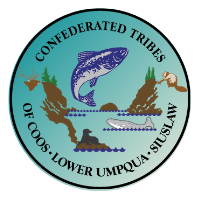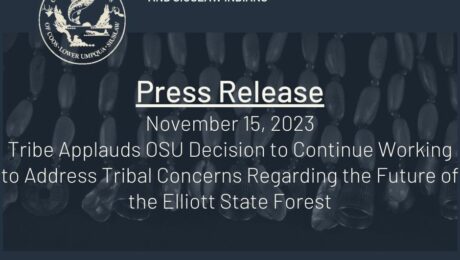TRIBE APPLAUDS OSU DECISION TO CONTINUE WORKINGTO ADDRESS TRIBAL CONCERNS REGARDING THEFUTURE OF THE ELLIOTT STATE FOREST
November 15, 2023, Coos Bay, Oregon – The Confederated Tribes of the Coos, Lower Umpqua and Siuslaw Indians (“Tribe”) applauds an announcement earlier this week from OSU President Jayathi Murthy recognizing that significant changes must be made to the proposed management direction for the Elliott State Research Forest. OSU’s announcement follows an October 20 letter from the Tribe to OSU that voiced serious concerns regarding the viability and ecological integrity of the proposed management direction for the Elliott.
The Tribe’s letter expressed concern that the proposed management direction would put the majority of the Elliott into no-touch reserves, where a sustainable and ecologically appropriate approach to stewardship would be precluded. Under the current proposal, approximately two-thirds of the Elliott would be designated as reserves where no harvest – not even selective harvest methods such as thinning – would be allowed following an initial treatment. This approach stands in contrast to a Tribal approach, which favors active stewardship to promote an ecologically diverse and resilient landscape.
“OSU’s decision demonstrates that it values its partnerships with the original inhabitants and stewards of these lands. We believe that putting the majority of the Elliott into reserves is misguided,” said Tribal Council Chair Brad Kneaper. “Doing so ignores the fact that these forests have been stewarded by Tribal people since time immemorial. We traditionally used fire, pruning, harvesting, and planting to create a healthy and diverse landscape. As a result of this Tribal stewardship, the forest was not simply a closed-canopy forest. It included open areas such as meadows, and it included young as well as old trees. The forest was healthy, and helped to provide the Tribe with the culturally important species such as deer and elk, salmon and lamprey, berries, and cedar on which our people and our culture thrived.”
While reserves are promoted by some as a way to protect imperiled species that depend on old forests with large trees, the Tribe questions this approach. “Over time, these no-touch reserves will grow into an uninterrupted expanse of dark closed-canopy forest,” said Chair Kneaper. “These overgrown conditions lack diversity. They provide very little in terms of habitat for threatened species. They’re also prone to catastrophic, unnatural wildfire. These forests depend on human stewardship to maintain more open and diverse forest conditions, which benefits plans and animals as well as people.”
The Tribe’s letter also expressed concern over the operational and financial viability of the forest, both of which the Department of State Lands had promised would be cornerstones of any management plan for the Elliott. “The current proposal for the Elliott simply isn’t operationally or financially viable,” said Colin Beck, Director of Forest Management for the Tribe. “Lots of little compromises were made during the process of developing the current management direction for the Elliott. In the aggregate, those compromises would put us in a box where we have very little room to actually implement management projects.
In addition, anticipated management and research costs fall well short of projected revenues. This is one of the most productive forests in the world. It once generated millions of dollars annually for the Common School Fund. Management of the Elliott should serve as a model for other forests to follow, demonstrating that we can manage forests in a holistic and balanced way that also provides a level of economic output. An Elliott State Research Forest that can’t even break even would be seen as a failure, and it certainly wouldn’t be a model that others would want to emulate.”
OSU’s decision to delay final action on the Elliott and continue to work with the Tribe and stakeholder groups to address these concerns is a positive step in the right direction, and will prevent further damage to our Eco System. Unfortunately, a November 14 letter from DSL Director Vicki Walker sent in response to OSU’s decision reaffirms DSL’s commitment to moving forward with the current Research Proposal, Forest Management Plan and Habitat Conservation Plan.
The Tribe hopes that DSL will reevaluate this position and will continue to work with the Tribe rather than move forward against the opposition of the Tribe. “Our people have been here and have managed the Elliott since time immemorial. We have thousands of years of experience managing what we now call the Elliott,” said Chair Kneaper. “We hope that DSL will join OSU in recognize the value of this Indigenous Knowledge, and recommit to working with the Tribe to reach a solution that better meets the needs of wildlife, the Tribe, and the community as a whole.”
- Published in Public Notices, Tribal Event, Tribal News

